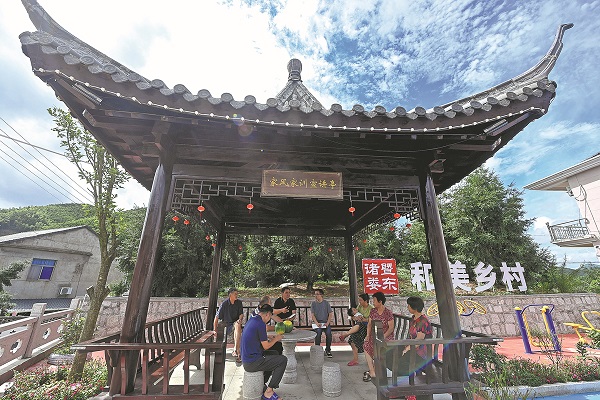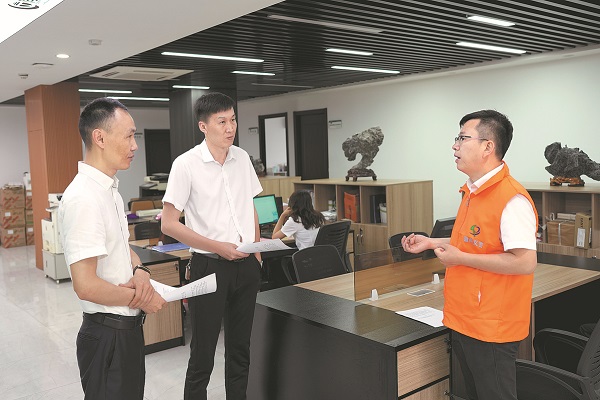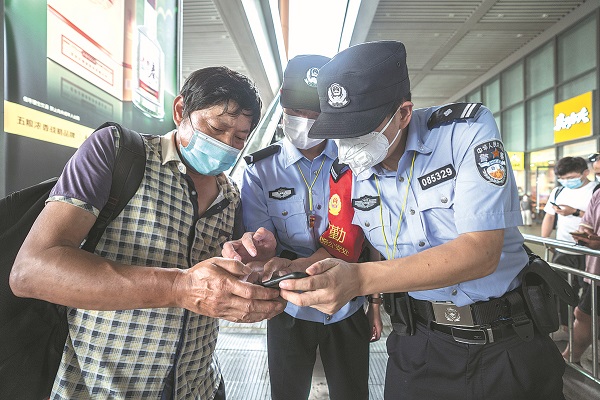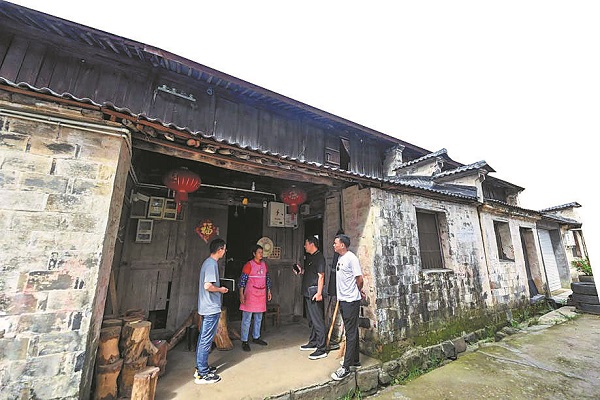Dispute resolution system sees high success rate

Officials from Dongbaihu town, Zhuji city, Zhejiang province, meet with local villagers in July to exchange views on livelihood projects and seek suggestions from the residents. [Photo/Xinhua]
Thousands of foreign-related conflicts resolved by mediators
In bustling Yiwu, Zhejiang province, a distinctive mediation system has emerged as a savior for businesses involved in foreign trade disputes.
For the past eight years, Sushil, a seasoned foreign trade businessman and mediator, has witnessed this system effectively resolving disputes at an early stage, preventing the collapse of hundreds of businesses.
Having spent two decades navigating the intricacies of foreign trade in Yiwu, Sushil is well aware that disputes are an inherent part of running a business.
He said that unresolved disputes not only disrupt mutual understanding between different parties, but also divert crucial time, finance and other resources to complex problem-solving processes.
Recognizing the need for a fast, efficient and easily accessible dispute resolution system to facilitate local development, the authorities in Yiwu established in 2013 the country's first people's mediation committee for foreign-related disputes.
The Commission for Political and Legal Affairs, or CPLA, of the Communist Party of China Yiwu Committee said the mediation committee enlisted foreign entrepreneurs based in Yiwu to serve as mediators. A team of 14 mediators from 13 countries has been formed in the city. Between them, the mediators speak nine major languages used worldwide.
As of September, 1,219 foreign-related disputes had been successfully mediated, involving a total amount of 132 million yuan ($18.6 million), with a success rate of 98 percent.
The foreign mediation model championed by Sushil is a dynamic process designed to resolve business or civil disputes between foreign and local entities. It revolves around mutual discussions, presenting subject details supported by evidence or a preliminary investigation.
Discussions are grounded in law, rights equality, and negotiations that uphold integrity. The mediation committee, known for its speed, and which provides its services for free, has proved to be the epitome of efficient conflict resolution, Sushil said.
Having joined the mediation committee as a volunteer in 2015, Sushil said all foreign mediators are volunteers who act as facilitators to encourage discussion and negotiation between parties, and guide them toward a resolution to their dispute.
Each mediator often starts with primary training involving the mediation process, basic law, legal procedures and studies, and they also witness ongoing mediation cases, he said.
Mediators are assigned cases based on availability and language, Sushil said. The mediation model consists of professionals drawn from the ranks of foreign businesspeople, lawyers, market administrators, shipping experts, the Ningbo Maritime Court, and various organizations and associations.

A volunteer police officer (right) visits a trading company in Zhuji to learn about its operational problems. [Photo/Xinhua]
Sailing delay
In a recent case that Sushil heard, the dispute centered on a delay to the sailing time of a shipment and the buyer's claim of not being provided the promised 21 days of free storage by the shipping line at the port, leading to hefty charges.
With the meticulous presentation of chat records and evidence provided by the applicant, Sushil, using his extensive knowledge of foreign trade, revealed the absence of a formal shipping contract specifying details such as sailing time and destination. The applicant's claim regarding the balance amount was resolved through careful calculations of payments made by the applicant. Eventually, the money was returned to the applicant, and the case was closed.
"I have been involved in different cases and have maintained a harmonious environment to enable comfortable negotiations to resolve cases with mutual understanding. Over the years, I've successfully resolved more than 100 cases," Sushil said.
In recognition of Yiwu's mediation prowess, the city's foreign mediation committee was selected last month by the Commission for Political and Legal Affairs of the CPC Central Committee as one of the 104 "Fengqiao model" units to promote community-level governance.
Sushil emphasizes the importance of mediators being completely honest and using their knowledge in the right way for self and community development, to enable the mediation committee to support economic stability and law-abiding cooperation.
The "Fengqiao model", which originated 60 years ago in Zhejiang, and relies on the people to resolve disputes at the community level, has since been promoted nationwide.
Residents are encouraged to address and prevent disputes locally by using legal processes and other effective methods, with the aim of addressing small issues within a village, and also larger conflicts within a town, to prevent them from escalating.
Chen Wenqing, a member of the Political Bureau of the CPC Central Committee and head of the CPLA of the CPC Central Committee, said during a meeting last month that the "Fengqiao model" in the new era aligns with proactive and preventive governance philosophy, and resonates with the judicial philosophy of prioritizing harmony over litigation.
Economic and social development has brought an overall increase in conflicts, and the complexities of disputes make discovery, prevention and resolution challenging. The focus should be on prevention and mediation at the grassroots level, Chen said.
He stressed the need for grassroots prevention and mediation to foster a safe and peaceful social environment, contributing to rapid economic development and long-term social stability.
The CPC Central Committee's CPLA stresses conflict prevention and urges administrative, judicial and law enforcement authorities to investigate the root causes of disputes and enhance governance at source before disputes escalate. Party members, officials and law enforcement staff members should contact communities and villages to listen to public opinion and address their concerns.
The committee highlights the fundamental role of mediation in preventing and resolving conflicts, and requires the authorities to integrate mediation into the entire conflict resolution process. It has also called for efforts to standardize public mediation organizations at town and village levels, ensuring they operate lawfully with adequate personnel and effective systems.
In addition, industry regulatory and judicial administrative bodies should enhance guidance on administrative mediation, while adapting to trends in emerging industries such as finance and the internet, the committee said.
The Ministry of Justice said there are some 700,000 people's mediation committees nationwide, covering urban and rural areas. There are nearly 3.2 million mediators in China, with 410,000 working full-time.
From January to September, 11.8 million disputes were mediated across the country, enabling many of them to be resolved at the grassroots level before litigation was launched.

Police officers help a resident in need. [XU CHENG/FOR CHINA DAILY]
Experience shared
The success of the "Fengqiao model" extends beyond Yiwu to Weizhou island in Beihai, Guangxi Zhuang autonomous region. This popular tourist destination, which attracts millions of visitors annually, faces numerous travel-related disputes, with more than 80 percent of them involving prepayment and operational issues.
In 2020, the local authorities established a conflict resolution service center, which has achieved a dispute resolution rate of 94.85 percent. The number of cases handled by the local court has consistently fallen each year.
Su Youfeng, 37, a meditator at the center for more than two years, has witnessed a significant rise in the number of cases, especially during peak tourism periods such as the National Day holiday. As of last month, the center had handled more than 1,000 cases this year.
A recent case involved a tourist booking a hotel online but encountering problems on arrival. The tourist and hotel operator disagreed on the cancellation policy, as the visitor sought a full refund. After an hour of on-site negotiations, a compromise was reached, with the tourist compensating the hotel.
Disputes are often initially handled at the center, where mediators listen to parties' needs, and conduct mediation and negotiations, Su said, adding that business violations are transferred to local administrative departments for investigation.
"Successful mediation often requires patience and impartiality. If we do our job properly, a significant proportion of conflicts can be resolved on site," she said.
Su emphasizes the importance of psychological resilience for a mediator. She acknowledges that some complaints arise from poor services, so a mediator must maintain legal and regulatory standards to ensure fairness in addressing the root cause of disputes.
"We need to balance the interests of tourists and merchants, and consider reasonable arguments in mediation. Sometimes, both parties accuse us of taking sides, but there is no need for us to do so. Merchants aim to make money, tourists visit areas for leisure purposes, while our goal is to tackle disputes quickly to benefit both parties," she said. Some merchants and tourists who fail to strike an agreement after mediation turn to the judicial procedure, she added.
However, Su said numerous disputes related to tourism cannot simply be resolved through litigation due to the complexity of such cases. In addition, there are no specific measures for many issues, such as the amount that needs to be paid as a fine or refunded for a hotel checkout.
As a result, most disputes are resolved based on trade rules, established experience and mutual willingness via mediation, she said.
He Yanling, a professor at Renmin University of China's School of Public Administration and Policy, sees the "Fengqiao model" as a 60-year-old methodology for grassroots social governance in China.
In various local practices, the authorities and public not only simply replicate the original experiences of Fengqiao township, Zhejiang, but adapt them to local conditions to provide a modern governance approach tailored to the grassroots in China, He said.

Officials from Dongbaihu visit households to learn about villagers' land disputes. [Photo/Xinhua]
"A successful model is not defined solely by its early practices, but by the logic and mechanisms that supported those practices at the time. This dynamic aspect gives it vitality, which is what we also need to learn and develop today," she said.
The core of the model lies in resolving conflicts at the grassroots level. Grassroots areas, situated at the end of the administrative power chain, have relatively limited authority and resources, and are where problems emerge.
"The widespread use of local traditional, cultural and community resources is a key factor in the success of the 'Fengqiao model'," He said.
The model also integrates with the rule of law and government administrative resources by using different mechanisms based on specific situations, rather than rigidly applying a single set of procedures, she said.
The consultation process often includes reasoning, legal considerations, emotions and conscience. To minimize loss, the parties involved may need to compromise a little to resolve conflicts, she said.
"The enduring vitality of the 'Fengqiao model' is deeply rooted in grassroots Chinese society, driven by a cultural inclination toward negotiation and collaboration. Governance approaches should be embedded in this social psychological mechanism for optimal results," she added.
The success of such a model depends on its compatibility with external environments and conditions, He said. She added that with residents' increased mobility and diversified values in modern society, traditional moral and emotional benchmarks in small communities have limited impact, yet legal and deterministic judicial mechanisms are playing an increasingly important role.
People are now more accustomed to resolving issues through cost-effective judicial systems, and that is why the "Fengqiao model" must be deeply integrated with law-based governance, she said.

Ministry of Justice of the
People's Republic of China
All rights reserved. Presented by China Daily.
京ICP备13016994号-2


